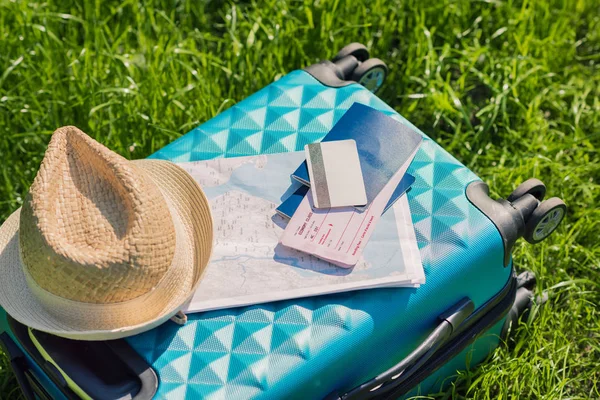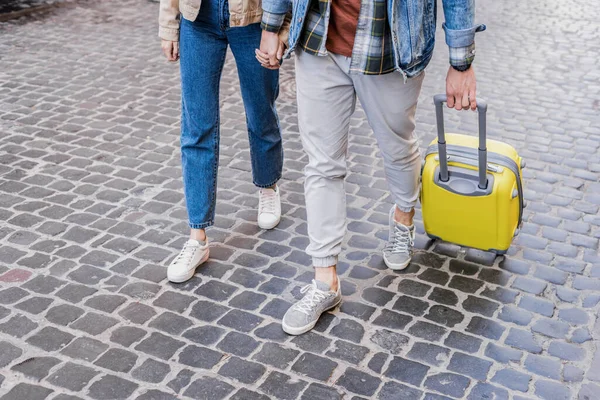
The benefits of traveling and how to plan an affordable trip
Traveling is one of life's greatest joys. Not only does it allow you to see new places and experience different cultures, but it also has a host of benefits for your physical and mental health, personal growth, and overall well-being. But let's be real, traveling can be expensive. But it doesn't have to break the bank. With some planning and research, you can plan an affordable trip that will leave you feeling rejuvenated and refreshed.
The benefits of traveling are many. From reducing stress to improving your mood, expanding your worldview, and helping you become more independent, traveling can have a positive impact on your mental and physical health. Not to mention the memories and experiences that will last a lifetime. And let's not forget, it's also a great opportunity to take Instagram-worthy photos, so you can make all your friends and family jealous.
But how do you plan an affordable trip? It starts with researching destinations and finding deals on flights and accommodations. Being flexible with your travel dates, considering alternate airports, and looking into vacation rental websites, hostels, and alternative options like couchsurfing or camping can help you save money on accommodations. And when it comes to budgeting for expenses, setting a budget, prioritizing activities and experiences, and finding free or low-cost options can help you stretch your dollar further. So, pack your bags and get ready for an adventure that won't break the bank!
How traveling can improve mental health

When it comes to traveling and mental health, the benefits are clear. Traveling can reduce stress, improve mood, and even increase cognitive function. It's like a mental health spa vacation, except instead of just relaxing in a robe, you get to see new places and meet new people.
First of all, traveling can be an effective stress-reliever. It allows you to step away from the daily grind and routine of life. Instead of worrying about work, responsibilities, and the to-do list, you can focus on the present moment and enjoy your surroundings. Plus, the act of planning a trip can be exciting and provide a sense of accomplishment.
Additionally, traveling can have a positive impact on your mood. Seeing new places, experiencing different cultures, and trying new things can all boost your mood and provide a sense of adventure. Plus, being in a new environment can also help break negative thought patterns and provide a fresh perspective.
Lastly, traveling can also improve cognitive function. Learning about new cultures and navigating unfamiliar environments can challenge your brain and improve cognitive flexibility. Plus, the act of planning a trip can also improve problem-solving and decision-making skills.
So, next time you're feeling stressed or down, consider booking a trip. Not only will you get to see new places and make memories, but you'll also be doing something good for your mental health. And remember, traveling doesn't have to break the bank, with some planning and research, you can find affordable options that still provide all the mental health benefits.
The benefits of cultural immersion

Cultural immersion is one of the most enriching and rewarding parts of traveling. It allows you to learn about different customs, traditions, and ways of life, and it can broaden your perspective, deepen your understanding, and help you appreciate the world in new ways. But what exactly are the benefits of cultural immersion? Let's take a look.
First and foremost, cultural immersion allows you to gain a deeper understanding of different cultures. Instead of just reading about a place or seeing it on TV, you get to experience it firsthand. You get to see how people live, what they value, and what their daily routines are like. This can help break down stereotypes and biases, and provide a more nuanced understanding of different cultures.
Cultural immersion can also broaden your perspective. Seeing how other people live, can help you appreciate the things you have and the way you live. It can also give you new ideas and inspiration, and help you see the world in new ways. You might return home with a new outlook on life, seeing things that you may have taken for granted in a new light.
Lastly, cultural immersion can also help you become more open-minded and accepting. By experiencing different cultures, you can learn to appreciate and respect the diversity of the world. It can also help you become more understanding and compassionate towards others and reduce the fear of the unknown.
In conclusion, cultural immersion is not just about trying new foods and seeing new sights, it's about learning, growing, and becoming a more open-minded, understanding and compassionate person. So next time you're planning a trip, don't just think about the destination, think about the cultural experience that awaits you and how it can benefit you in the long run.
The personal growth that comes from traveling 

Traveling is not just about seeing new places and experiencing different cultures, it's also about personal growth. When you step out of your comfort zone and into the unknown, you can challenge yourself, gain confidence, and become more independent. So, what exactly are the ways in which traveling can lead to personal growth? Let's take a look.
One of the most significant ways traveling can lead to personal growth is by challenging yourself. Whether it's navigating a new city, trying new foods, or communicating in a foreign language, traveling forces you to step out of your comfort zone. And when you face and overcome these challenges, you gain confidence in yourself and your abilities.
Traveling also allows you to gain independence. When you're on your own in a new place, you have to rely on yourself to make decisions, solve problems, and navigate unfamiliar environments. This can help you become more self-reliant and confident in your own abilities. Plus, it can also help you appreciate and rely on the support of others, making you more humble and grateful.
Lastly, traveling can also lead to personal growth by providing new perspectives and experiences. Being in a new place and experiencing different cultures can help you see things in a new light and gain a new perspective. It can also open your mind to new ideas, experiences, and ways of living, providing you with an opportunity for personal growth and self-discovery.
In conclusion, traveling is not just about seeing new places, it's also
about personal growth. It challenges you, helps you gain confidence and independence, and provides new perspectives and experiences that can help you discover new things about yourself. So next time you're planning a trip, remember that it's not just about the destination, it's also about the personal growth and self-discovery that awaits you.
Planning an affordable trip

When it comes to traveling, one of the biggest concerns is often the cost. But the good news is, with some planning and research, you can plan an affordable trip that won't break the bank. From researching destinations to finding deals on flights and accommodations, there are several ways to save money on your next adventure.
The first step in planning an affordable trip is researching destinations. Look for places that are known for being budget-friendly, such as Southeast Asia, Mexico, or Eastern Europe. Also, consider traveling during the off-season when prices are typically lower.
Next, focus on finding deals on flights and accommodations. Use fare comparison websites to find the best deals on flights, and consider being flexible with your travel dates. When it comes to accommodations, look into vacation rental websites, hostels, and alternative options like couchsurfing or camping.
Another way to save money on your trip is to budget for expenses. Set a budget for your trip and prioritize the activities and experiences that are most important to you. Also, look for free or low-cost options, such as hiking in nature, visiting museums that offer free admission, or taking a free walking tour.
Lastly, when it comes to food, it's possible to save money by cooking meals, finding local markets, and taking advantage of free breakfast at your accommodations.
In conclusion, planning an affordable trip is possible with some research and planning. By researching destinations, finding deals on flights and accommodations, budgeting for expenses, and saving money on food, you can have an amazing adventure without breaking the bank. So, don't let the cost hold you back from your next great adventure!
How to find affordable flights

When it comes to traveling, the cost of flights can often be a significant expense. But with a little bit of research and flexibility, you can find affordable flights that won't break the bank.
The first step in finding affordable flights is to use fare comparison websites. These websites allow you to compare prices from different airlines and travel agencies, making it easier to find the best deals. It's also a good idea to sign up for email alerts from airlines and travel agencies, as they often send notifications about sales and special offers.
Another way to find affordable flights is to be flexible with your travel dates. If you're willing to travel during the week or on off-peak days, you're more likely to find lower prices. Also, consider traveling during the shoulder season, which is the time between peak and off-peak season, when prices are typically lower.
Another tip to find affordable flights is to consider alternate airports. Sometimes, flying into a nearby airport or taking a connecting flight can save you money. Look for flights to airports that are less popular but still close to your destination, or look for flights that have a layover in a city you are interested in visiting.
Lastly, it's also important to book in advance as much as you can. Typically, the earlier you book, the cheaper the flight will be.
In conclusion, finding affordable flights doesn't have to be a daunting task. By using fare comparison websites, being flexible with your travel dates, considering alternate airports, and booking in advance, you can find great deals on flights and save money on your next adventure. So, don't let the cost of flights hold you back from traveling, start searching and planning your next trip today!
How to find affordable accommodations

When it comes to traveling, the cost of accommodations can also add up quickly. But with a little bit of research and creativity, you can find affordable accommodations that won't break the bank.
One of the best ways to find affordable accommodations is to use vacation rental websites such as Airbnb, VRBO, or Booking.com. These websites allow you to rent apartments, homes, or rooms directly from the owners, often at a lower cost than traditional hotels. They also offer a wide variety of options, from budget-friendly to luxury, and can give you a more authentic and local experience.
Another way to find affordable accommodations is to stay in hostels. Hostels offer dormitory-style rooms at a lower cost than traditional hotels, and they often have shared facilities such as kitchens, bathrooms, and common areas. Hostels are a great option for solo travelers and backpackers, and they can also be a great way to meet other travelers.
Another tip is to consider alternative options like couchsurfing or camping. Couchsurfing is a platform that connects travelers with local hosts who offer a place to stay for free. Camping, on the other hand, is a budget-friendly option that allows you to spend the night in nature. Both options can be a great way to save money on accommodations and have a unique experience.
Lastly, when looking for accommodations, also consider the location. Staying in a less popular but still close to your destination, or in areas that are slightly off the tourist path, can save you money.
In conclusion, finding affordable accommodations doesn't have to be a challenge. With a little bit of research and creativity, you can find great deals on vacation rental websites, hostels, alternative options like couchsurfing or camping, and also by considering location. So, don't let the cost of accommodations hold you back from traveling, start searching and planning your next trip today!
Budgeting for expenses while traveling

When it comes to traveling, budgeting for expenses can be a daunting task. From accommodation, flights, transportation, food, and activities, the costs can add up quickly. But with a little bit of planning and discipline, you can budget for expenses while traveling and still have a great time.
The first step in budgeting for expenses while traveling is to set a budget. Determine how much money you have available for your trip and allocate it to different expenses such as accommodation, flights, transportation, food, and activities.
Next, prioritize your expenses. Identify the activities and experiences that are most important to you and allocate your budget accordingly. For example, if you want to visit a specific attraction or go on a guided tour, make sure to set aside enough money for it.
Another way to save money while traveling is to look for free or low-cost options. Many cities and towns offer free walking tours, free museum days, or free outdoor activities. Take advantage of these options and enjoy the local culture without spending a lot of money.
When it comes to food, you can save money by cooking your own meals, finding local markets, and taking advantage of free breakfast at your accommodations. Also, consider trying street food or local restaurants, as they often offer delicious and budget-friendly options.
Lastly, it's important to stick to your budget while traveling. Keep track of your expenses, and if you find yourself overspending, adjust your budget accordingly and make adjustments to your plans.
In conclusion, budgeting for expenses while traveling is possible with a little bit of planning, discipline, and research. By setting a budget, prioritizing your expenses, looking for free or low-cost options and sticking to your budget, you can have a great time while traveling without breaking the bank. So, start planning and budgeting for your next trip today!
How to save money on food while traveling 

When it comes to traveling, food can be a significant expense. But with a little bit of planning and creativity, you can save money on food while traveling and still enjoy delicious meals.
One of the best ways to save money on food while traveling is to cook your own meals. Many vacation rental properties and hostels have kitchens, so you can buy groceries and prepare your own meals. This can save you a lot of money, especially if you're traveling with a group. Plus, cooking your own meals can also be a great way to experience the local cuisine and culture.
Another way to save money on food while traveling is to find local markets. Many cities and towns have local markets where you can buy fresh fruits, vegetables, and other local products at a lower cost than supermarkets or restaurants. Plus, it's also a great way to experience the local culture and interact with locals.
Another tip is to take advantage of free breakfast at your accommodations. Many hotels and hostels offer free breakfast as part of their services, so make sure to take advantage of it and start your day with a full stomach.
Additionally, try street food, local restaurants, and food trucks. These options often offer delicious and budget-friendly meals, and they can also be a great way to experience the local cuisine and culture.
Lastly, be mindful of your spending, keep track of your expenses, and adjust your plans if necessary.
In conclusion, saving money on food while traveling is possible with a little bit of planning and creativity. By cooking your own meals, finding local markets, taking advantage of free breakfast, trying street food and local restaurants, and being mindful of your spending, you can have delicious meals while traveling without breaking the bank. So, start planning and budgeting for your next foodie adventure today!
Conclusion
In conclusion, traveling is one of life's greatest joys. It allows you to see new places, experience different cultures, and gain new experiences and perspectives. But it can also be expensive. However, with some planning and research, you can plan an affordable trip that won't break the bank. From researching destinations to finding deals on flights and accommodations, budgeting for expenses, and saving money on food, there are many ways to save money on your next adventure.
Additionally, traveling has many benefits for your physical and mental health, personal growth, and overall well-being. From reducing stress, improving mood, and expanding your worldview, to becoming more independent and open-minded, traveling can have a positive impact on your life.
Cultural immersion is also an important aspect of traveling, it allows you to gain a deeper understanding of different cultures, broaden your perspective, and become more open-minded and accepting.
In addition, traveling can lead to personal growth, by challenging yourself, gaining independence and confidence, and providing new perspectives and experiences.
Lastly, budgeting for expenses while traveling and saving money on food are also important aspects to consider when planning a trip.
In summary, traveling is not just about seeing new places, it's also about learning, growing, and having new experiences. So, don't let the cost hold you back from your next adventure, start planning and budgeting for your trip today, and make the most of it!
The benefits of traveling and how to plan an affordable trip
 Reviewed by jadan
on
January 26, 2023
Rating:
Reviewed by jadan
on
January 26, 2023
Rating:
 Reviewed by jadan
on
January 26, 2023
Rating:
Reviewed by jadan
on
January 26, 2023
Rating:




No comments: